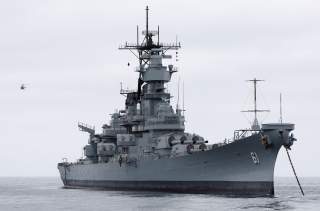Sunk U.S. Battleships During the Gulf War? Saddam Could Have Pulled It Off.
A difficult task.
You need not embrace Hanson’s views in whole—Saudi forces, to name one of many non-Western coalition partners, acquitted themselves well in Desert Storm—to appreciate that a cultural chasm did separate the Iraqi armed forces from their foes. Part of the Iraqi military’s problem must have stemmed from its drawn-out bloodletting with Iran, still a recent memory when Saddam ordered the invasion of Kuwait. This was an exhausted and demoralized force. But the nature of Iraqi society and government must be largely responsible as well.
Saddam Hussein was a tyrant, and tyranny makes armed forces—or any institution, really—stupid.
A ruler like Saddam, who appoints himself generalissimo of the armed services and regards ideas that contradict his own as a threat, squelches the lively debate that constitutes the lifeblood of strategic thought. Had Saddam encouraged freethinking among his commanders instead of crushing it mercilessly, it’s possible Iraqis would have fared far better in 1991—and that the defenders of occupied Kuwait may have landed far more telling blows against coalition navies, including battleships, that menaced their maritime flank.
Alternative history is a pleasant diversion—and useful when it furnishes a reminder of timeless verities such as the need to size up prospective foes’ martial cultures as well as their arsenals.
James Holmes is J. C. Wylie Chair of Maritime Strategy at the Naval War College. The views voiced here are his alone. This first appeared earlier in 2019.
Image: Reuters.

